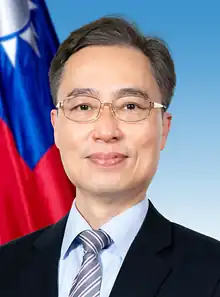Iván Yueh-Jung Lee
Iván Yueh-Jung Lee[2] (Chinese: 李岳融; pinyin: Lǐ Yuèróng) is a diplomat of the Republic of China, commonly known as Taiwan. He served as his country's final ambassador to Nicaragua in 2021, being appointed in November 2021.[3]
Iván Yueh-Jung Lee | |
|---|---|
 | |
| Executive Director of the Congressional Affairs Office of the Ministry of Foreign Affairs of the Republic of China | |
| Assumed office September 2022 | |
| Preceded by | Steve C.C. Hsia |
| Ambassador of the Republic of China to Nicaragua | |
| In office November 2021 – December 2021 | |
| Preceded by | Jaime Chin-Mu Wu |
| Succeeded by | Office abolished[1] |
| Representative of the Republic of China to Peru | |
| In office November 2018 – November 2021 | |
| Preceded by | Miguel Tsao |
| Succeeded by | Francisca Yu-Tsz Chang |
| Personal details | |
| Alma mater | Wenzao University Tamkang University |
| Occupation | Diplomat |
Biography
Lee graduated as a Bachelor of Spanish Literature/Master of European Studies from the Spanish Department of Wenzao Ursuline University of Languages and from Tamkang University. He served as Second Secretary of the Embassy in Paraguay, Chief of the Caribbean Section of the Central and South American Department of the Ministry of Foreign Affairs, Chief of the Communication Section of the Protocol Department of the Ministry of Foreign Affairs, Deputy Counselor of the Embassy in Paraguay, deputy director of the Protocol Department of the Ministry of Foreign Affairs, Minister Representative of the Taipei Economic and Cultural Office in Peru, Ambassador to Nicaragua, etc.[2][4][5][lower-alpha 1] He is currently the executive director of the Congressional Affairs Office of the Ministry of Foreign Affairs.[9]
In 2019, Lee wrote an article in support of Taiwan's participation in that year's World Health Assembly organised by the World Health Organization, which was published in Peruvian newspapers on March 31 and April 1 of the same year.[10]
In November 2021, Li Yuerong was appointed as the ambassador to Nicaragua and presented a copy of his credentials to the country's Foreign Minister, Denis Moncada. In December, Nicaragua broke off diplomatic relations with the Republic of China before Li was able to submit the original letter of credentials to the country's president, Daniel Ortega.[11]
Notes
- In September 2012, in order to unify the internal professional titles of personnel stationed abroad, the Ministry of Foreign Affairs of the Republic of China clearly stipulated that embassies and representative offices should have ambassadors and ministers, and representative offices would still be called representatives and deputy representatives.[6][7] The head of the representative office has the rank of ambassador from the thirteenth to the fourteenth rank of the special appointment or the senior rank, and the minister representative from the twelfth to the thirteenth rank of the senior rank; the head of the representative office has the rank of the twelfth rank of the general consul, and the deputy director has the rank of deputy consul general from the tenth to the eleventh rank.[8]
References
- "中華民國政府基於維護國家尊嚴,決定自即日起終止與尼加拉瓜的外交關係". 中華民國外交部. 拉丁美洲及加勒比海司. 2021-12-10.
- "SR. IVAN YUEH-JUNG LEE, REPRESENTANTE DE LA OFICINA". Ministry of Foreign Affairs, Republic of China (Taiwan). 2018-11-28.
- "RECONOCER AL EXCELENTÍSIMO SEÑOR IVÁN YUEH JUNG LEE, EN EL CARGO DE EMBAJADOR EXTRAORDINARIO Y PLENIPOTENCIARIO DE LA REPÚBLICA DE CHINA (TAIWÁN), ANTE EL GOBIERNO DE LA REPÚBLICA DE NICARAGUA". La Gaceta Nicaragua. 2021-11-25.
- "駐秘魯代表處李代表岳融簡歷". 中華民國駐外單位聯合網站. 2018-11-24.
- "駐尼加拉瓜新任大使李岳融夫婦與尼京市長Reyna Rueda共同主持貧民新屋捐贈事". 中華民國駐外單位聯合網站. 2021-11-25.
- "外交部針對本(8)月31日媒體報導我駐無邦交國家代表對內改稱「大使」事,特澄清說明". 中華民國外交部. 公眾外交協調會 (新闻稿). 2012-08-31.
- 陳, 培煌 (2012-08-31). "統一名稱 代表對內稱大使". 中央通訊社.
- "駐外機構組織通則". 中華民國法務部全國法規資料庫. 2018-06-13.
- "主管簡歷". 中華民國外交部. 國會事務辦公室. 2022-09-20.
- "李岳融代表投稿專文「臺灣爭取支持參與2019年世界衛生大會及世界衛生組織」". 中華民國駐外單位聯合網站. 2019-04-04.
- "李岳融11月駐尼加拉瓜即逢斷交 成末代大使". 聯合新聞網. 中央社. 2021-12-10.